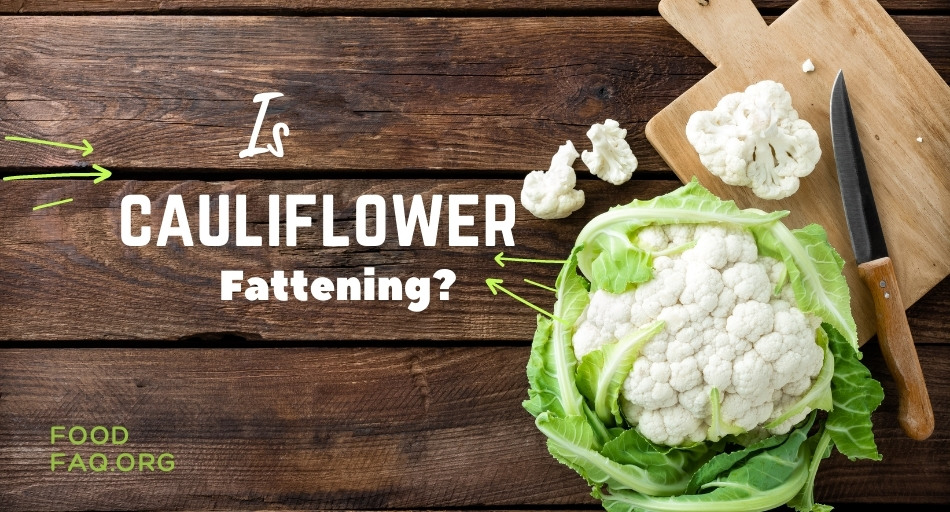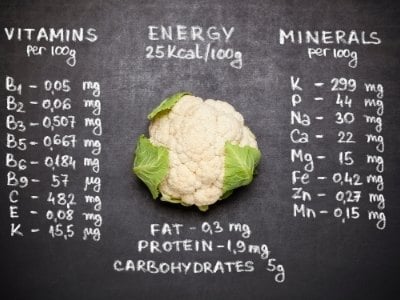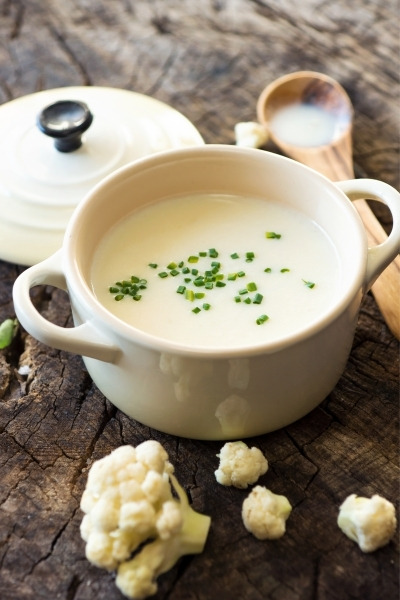Cauliflower is a very healthy vegetable that is incredibly versatile. It can be roasted, boiled, and even eaten raw, so there are no limits to how you can eat it.

Cauliflower is also an excellent source of various nutrients, vitamins, and minerals that contribute to good health.
If you’re trying to lose weight, it’s important to eat a lot of veggies, but some of them might be high in calories. But what about cauliflower? Is it fattening?
Table of Contents
Is cauliflower fattening?
Cauliflower contains very few calories no matter how you prepare it. It’s also a wonderful source of important nutrients that contribute to the health of your digestive system, helping you lose weight.
What’s more, cauliflower contains a lot of antioxidants, which lower your risk of many health conditions.
So, between all these benefits and how easy it is to add to any diet, there’s no reason you shouldn’t eat cauliflower.
How many calories are in cauliflower?
One cup of cooked cauliflower contains around 28.6 calories. As you can see, cauliflower is an incredibly low-calorie vegetable, which makes it perfect for weight loss.
Cauliflower can be eaten on its own, as a side dish, and you can even make soup using it. It’s incredibly versatile, so adding it to a weight loss-friendly diet is very easy and effortless.

Some people prefer to add raw cauliflower to their salads. A one-cup serving of raw cauliflower provides you with around 50 calories.
Raw cauliflower can add crunchiness to your dishes while still providing you with a lot of nutrients, such as fiber, vitamin C, and potassium.
When eating raw cauliflower, make sure to wash it thoroughly to ensure that you’re not consuming any preservatives or chemicals.
You might have noticed that there is another variety of cauliflower, namely green cauliflower. It looks slightly different but still makes for a great veggie for weight loss.
Just ⅕ of the whole cauliflower head provides you with 29 calories. Even though it looks different, it still has a similar flavor. It also contains a lot of fiber, vitamin C, and even some protein.
Is cauliflower good for you?
Cauliflower contains many vitamins and minerals, but it’s especially high in vitamin C. A single serving of cooked cauliflower provides you with 92% of your daily need for this micronutrient.
Vitamin C, also known as ascorbic acid, reduces your risk of chronic conditions and boosts your immune system.

Eating foods high in this micronutrient also helps prevent iron deficiency, as vitamin C helps absorb this mineral.
Cauliflower also makes for a great source of antioxidants. These plant compounds help flush out free radicals from your body, preventing oxidative stress and damage to your cells.
This reduces your risk of various chronic conditions, including heart disease, diabetes, and cancer.
Antioxidants also prevent inflammation and boost your immune system, helping your body fight against viruses and bacteria. So, eating cauliflower can have excellent benefits for your health.
Adding cauliflower to your diet can also help you load up on choline. This essential nutrient found in plants has several important functions in your body.
For example, choline helps synthesize DNA, support metabolism, and even protect your nervous system from damage. It also prevents cholesterol from accumulating in the liver, preventing liver disease.
Many people don’t get enough choline from their diets, which has been shown to increase their risk of neurological disorders like dementia and Alzheimer’s.
For people following a low-carb diet, cauliflower can be a great replacement for grains and legumes.

Cauliflower is widely used to make rice, pizza crust, hummus, tortillas, and even mac and cheese. You can either buy these products in stores or make them yourself – both are great ideas.
Doing that can help you lower your intake of carbs and increase your intake of vegetables.
Should you eat cauliflower when trying to lose weight?
Cauliflower is very low in calories, which makes it a perfect veggie for a diet aimed at weight loss.
Consuming foods low in calories but rich in nutrients can help you feel fuller after eating without taking in too many calories.
Because of that, vegetables are often recommended for people who are trying to lose weight in a healthy way.
Cauliflower also contains quite a lot of fiber. One cup of cooked cauliflower packs 2.8 g of fiber, which corresponds to around 12% of your daily need for this nutrient.
Calorie for calorie, this amount makes cauliflower a high-fiber vegetable. Fiber helps you stay full after eating, which prevents you from taking in too many calories.
It also aids in satiety, curbs your hunger, and feeds the ‘good’ gut bacteria in your digestive tract. So, adding foods like cauliflower to your diet can help you lose weight.
Cauliflower is also primarily water, just like other veggies. Veggies with a high water content tend to fill you up faster, which makes you less likely to overeat.
Water also keeps you hydrated, which can help you drop some pounds since people often tend to confuse thirst for hunger.
So, eating foods with a high amount of water is really good for you in ways more than one.
Is cauliflower soup fattening?

Cauliflower soup can be a great addition to a weight loss diet, but it all depends on how you make it.
Store-bought creamy soups tend to be high in fat and sodium, which isn’t good for your health. To avoid that, try making clear cauliflower soups yourself using bone broth or vegetable stock.
That way, you might only consume around 130 calories in a single serving and much less sodium.
What’s more, cauliflower soup based on bone broth also provides you with a lot of minerals and electrolytes, which are very good for you.
Conclusion
Cauliflower is a great vegetable for weight loss. It’s low in calories, high in fiber, and loaded with minerals and vitamins.
What’s more, cauliflower is easy to add to any diet, whether you’re eating meat or following a plan-based dietary plan.
So, next time you’re shopping for vegetables, make sure to get some cauliflower. Your body will thank you.
